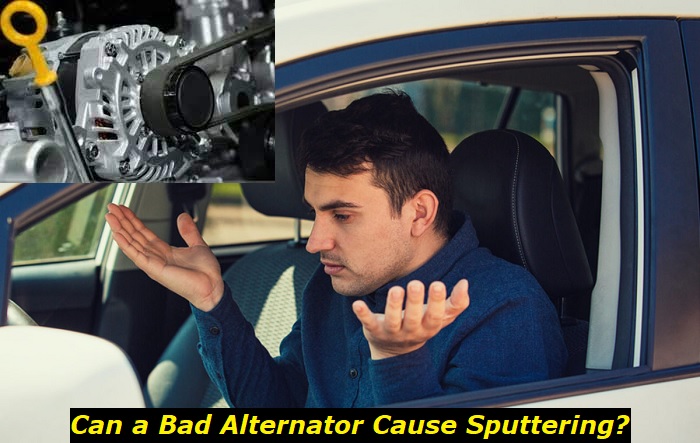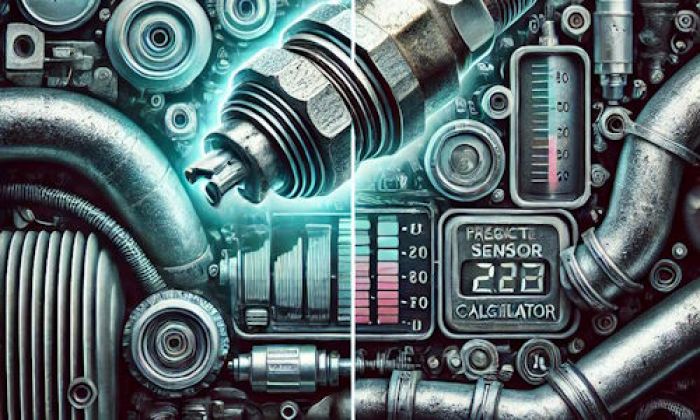A bad alternator can cause different problems and one of the possible symptoms is car sputtering because of misfires and other issues with the vehicle. When the units in your car don't get the needed power, they may start getting glitches and they may stop working completely or even fatally fail and get fried.
Alternator electrical problems highlights
- Level of urgency:high
- DIY inspection:possible but complicated
- DIY repairs:impossible
- Can you drive?yes
- Price of repairs:$150 - $800
- If ignored:power drains, brain glitching, car losing all power
- Ways to fix:check the voltage regulator, check the alternator, replace the broken unit

Bad alternator and sputtering - is there any connection?
Well, the sputtering engine can be the symptom of a lot of other car problems like spark plugs and coils, fuel supply, or injection problems. But sputtering can also be caused by lots of other issues including the faulty alternator.
To stop hesitating, you should understand how the alternator works. Here are some key points:
- the alternator takes over all the work in the electricity supply after the engine is started;
- it powers the spark plugs and the fuel pump and keeps all sensors and control units running;
- the voltage of the alternator should be around 14.6 volts so that it can also charge the battery;
- if the alternator fails to supply the car with needed power, things may stop working properly;
- sputtering can be the consequence of a bad power supply to spark plugs or issues with opening injectors;
- in most cases, the sputtering engine is the result of heavy misfires that may be caused by a faulty alternator.
But it's not the only reason (and not even the most obvious reason) for sputtering. Engine misfiring can easily be caused by many other things like a faulty ignition coil or problems with the wiring. Any faulty engine sensor can lead to this.
But the alternator is not that hard to check to make sure the sputtering is not its fault. So, it's always worth spending some time and making sure it's working well.
Ways to spot the faulty alternator
As I've already told you before, the good alternator will produce about 14.6 volts of electricity and you can check it by a multimeter using the terminals of the alternator. Also, you may check the voltage on the battery terminals. It should be about 14.5 volts after the engine is started and 12.5 volts when the battery is already charged. This will also prove that the voltage regulator is working properly.
If you don't have a multimeter or don't know how to use it, in most cases, you may still spot the wrong work of the alternator. For this, it's enough to pay attention to some other symptoms of the faulty alternator:
1) The battery loses charge too quickly
If the alternator is faulty, it means that the charge of your battery will be lost quite quickly. The battery will have to back up the system and will be drained much sooner than you expect it to happen.
2) The battery light may be illuminating
Whenever the battery is drained, you will see the battery light on the dash of your car. It means that the alternator can't cope with the load and the battery is actively engaged in the process of electricity supply which is not normal.
3) Uneven idling
When the alternator is unstable, this can lead to bad idle speed. Your engine may start going up and down when idling because the power will go up and down and will make all the electronic modules work poorly.
4) The lower the RPM, the worse the issue
Your faulty alternator may work well when the RPM is quite high. But it will literally go down once the RPM is low. The speed of rotation in the alternator directly depends on the engine speed because it's attached to the engine through the serpentine belt.
So, if you notice such symptoms and also spot sputtering in your car, you may be quite sure that the most obvious reason for that is the alternator. But it's always worth checking other possible issues. For example, the dying battery may also cause such symptoms.
What can you do to solve the problem?
Solving this issue is not that easy. Alternators can be repaired but, in most cases, it's cheaper to buy the new one and have it installed in the shop. Repairing an alternator is only lucrative when the voltage regulator is malfunctioning and you won't need to take this thing apart. Any repair that requires taking the vehicle apart is probably not worth the money.
So, first of all, you will need proper diagnostics to understand what exactly is happening with the unit. After that, the mechanic will tell you what are the ways to solve the problem.
Modern alternators usually live about 150,000 miles without serious problems. After this milestone, repairing them is not really a good idea because they may repeatedly fail in the future. Buying and installing the new alternator seems like a better option, in such cases.
Can you replace the alternator in your car on your own?
To save some money, a lot of drivers want to do as many services and repair things on their own as possible. But this can sometimes lead to even worse issues with your car and even higher expenses in the future.
If you decide to replace the faulty alternator, first of all, you will need to figure out if it's the culprit of your problems. Diagnose the vehicle and make sure this is exactly the alternator. Then, you will need to buy an OEM alternator for your car using VIN to avoid issues.
Also, you will require the following:
- several specific tools that you aren't likely to have in your possession right now, so buy or rent them;
- a place where you can work - it should have a car lift so that you can get to the needed parts of the car;
- some understanding of how things work in your car, otherwise, you can't even take off the serpentine belt;
- the experience or a friend who has experience in car repair - please don't think that it's easy because it's not;
- some time - without proper experience, you will probably need the entire day for this task.
As you see, this doesn't sound really good now. A professional mechanic will most likely do this for 2 hours and the price for labor will start at $120 for some shops and will average at about $200. While at first, it may seem like a lot, after you understand what you need for DIY repairs, you will most likely look at this price with different emotions.
Don't forget that this is just the price for labor, the alternator or the parts for its repair will add some money, too. The price depends on the brand and model of your vehicle.
Can you drive with a faulty alternator?
When you already see the car sputtering and the battery light flickering, you should understand that at any moment your vehicle may just die and you will be stranded. Even if the alternator is completely dead, the car will still spend some time using the power from the battery. But it's only about 2-3 hours with a completely healthy battery.
So, you can try driving several miles till you reach the nearest shop or dealership where you can get help. But driving the car for hundreds of miles or "till the next month" is not an option.
First of all, you may just get stranded one bad day. And secondly, it's not uncommon for faulty alternators to fry things in your car. So, if you keep driving with this problem, you risk getting even more damage and unpredictable repair costs.
Final thoughts
You should understand that the alternator is one of the important units in your vehicle. It powers all the modules, sensors, and parts in your car and makes sure they get the proper voltage. Without this part working properly, you just can't drive well. Also, serious malfunctions in the alternator can lead to other problems and conditions.
Sputtering vehicle and flickering battery light are direct symptoms of alternator problems. But if your car just sputters, there are a lot of other possible reasons to check. Make sure you don't just replace the alternator without properly checking it and ensuring that the problems are caused exactly by this unit.
About the authors
The CarAraC research team is composed of seasoned auto mechanics and automotive industry professionals, including individuals with advanced degrees and certifications in their field. Our team members boast prestigious credentials, reflecting their extensive knowledge and skills. These qualifications include: IMI: Institute of the Motor Industry, ASE-Certified Master Automobile Technicians; Coventry University, Graduate of MA in Automotive Journalism; Politecnico di Torino, Italy, MS Automotive Engineering; Ss. Cyril and Methodius University in Skopje, Mechanical University in Skopje; TOC Automotive College; DHA Suffa University, Department of Mechanical Engineering






Add comment